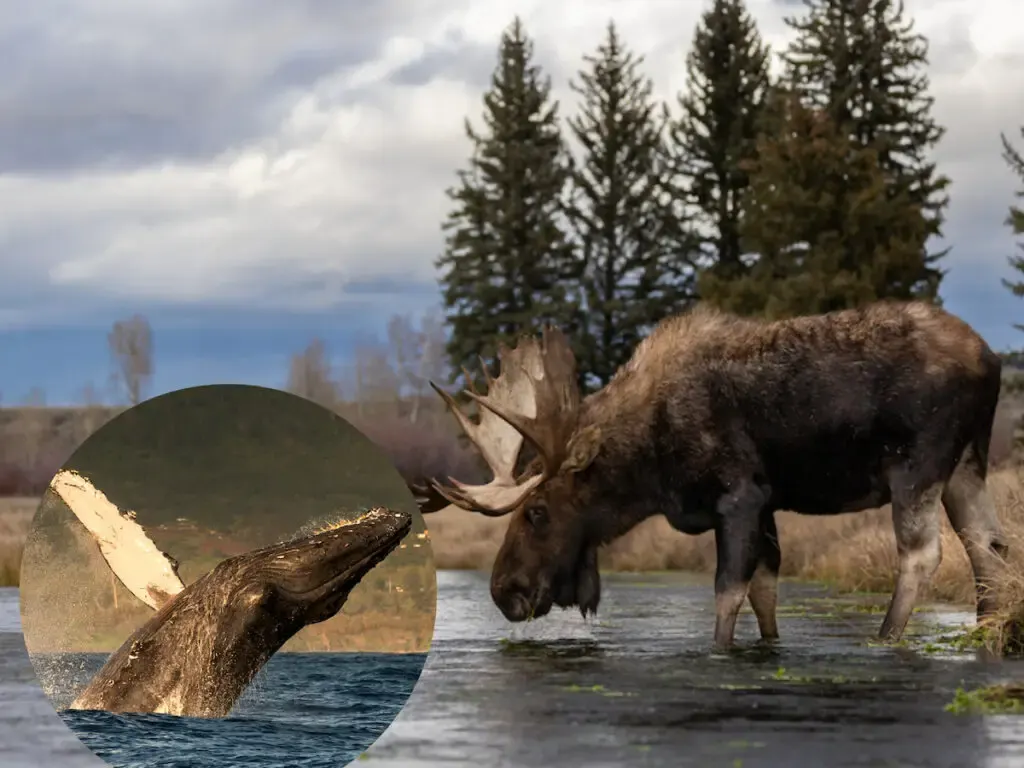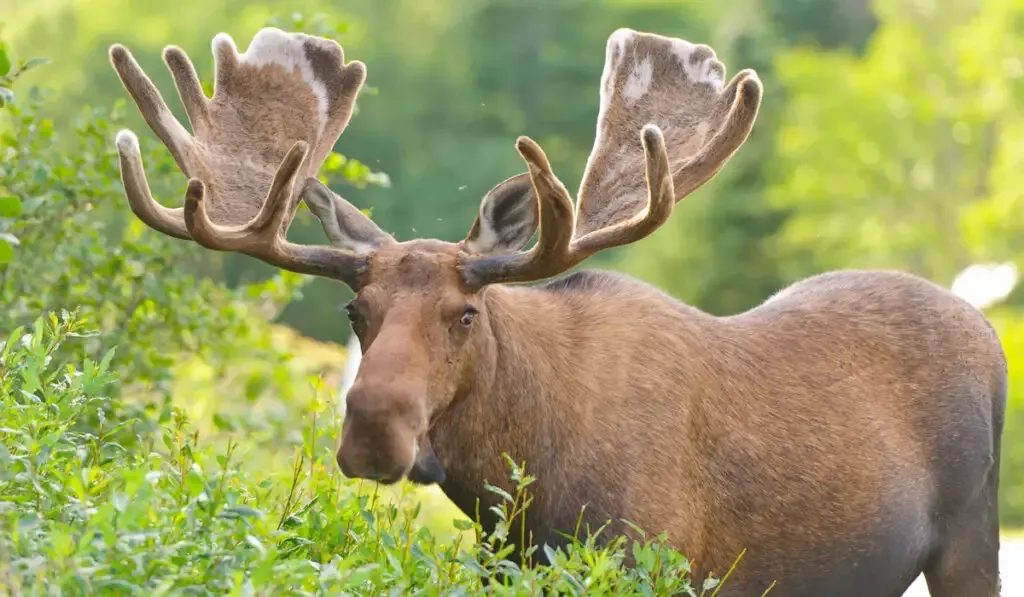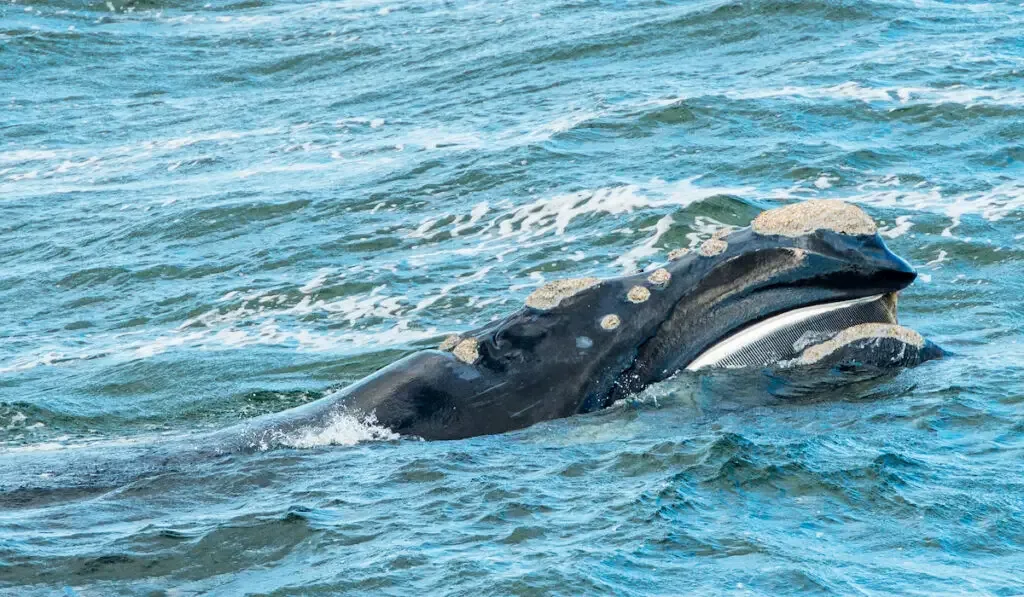With moose living on land and whales living in water, the prompt for this article might seem odd at first. But when you do some research here and there, you will find that moose and whales may actually encounter each other. But will a moose attack a whale? Let us find out.
Do moose attack whales?
In our search, we found no evidence that moose attack whales. In fact, the contrary might be the case.
When moose go searching for aquatic vegetation in summer, there is a chance that killer whales will prey on them. Besides, many whales species are multiple times larger than moose – the smallest whale species is about the same size as a moose. So, it is unlikely that a moose will try to attack them.

We delve into this topic further in the rest of this article. So, if you want to know more about the prey-predator relationship between moose and whales, read on.
Table of Contents
Will a Moose Attack a Whale?
A moose will not attack a whale.
Moose are land animals, so ordinarily, they spend most of their time on land. This means that they are unlikely to encounter whales. But in summer, moose sometimes wander into the waters in search of aquatic vegetation. During these times, they may come across whales.
When moose come across whales, they are unlikely to attack them. And even if they do attack whales, their hits may only be effective on smaller whales like dwarf sperm whales. But then, whales are much faster than moose in the water. So, the chances of a moose landing a hit on a whale are really low.
All in all, most whale species are multiple times larger than moose. So, moose are unlikely to attack them. Added to that, whales are more accustomed to water than moose. So, moose are at a total disadvantage if they attack whales under such conditions.
However, whales may actually go after moose. There are narratives of killer whales (orcas) killing moose. But so far, there are no concrete pieces of evidence to back the story.
Still, it would not be out of place for orcas to kill moose. Orcas are apex predators; they feed on marine animals of various sizes, even whales. So, hunting should not be an issue if they come across moose.

What Animals Do Moose Prey On?
Moose are herbivores, so they do not prey on any animal. They typically feed on grass, pondweed, and twigs.
While moose do not feed on animal matter, they can get very defensive when threatened by their predators. Sometimes when defending themselves, moose may attack and even kill their predators.
Besides humans, wolves and bears are the primary predators of moose. Interestingly, moose can sometimes kill these predators.
When a wolf is on its tail, a moose can kill it by kicking its head, but this rarely happens. As we said earlier, moose are herbivores, so they don’t go out looking to kill a wolf. Besides, they have other ways of defending themselves from wolves and may only fight back in rare cases.
If a moose kicks an adult-sized bear, it might only leave the bear dazed. But if the conditions are favorable, a moose might kill a small-sized bear with its antlers.
What Animals Do Whales Prey On?
There are many whale species, and each preys on different animals. Nonetheless, all whales are carnivorous animals, so they feed on animal matter.
Interestingly, most whales do not prey on large animals as one would expect. In fact, the blue whale, the largest animal ever, feeds primarily on krill. Krill are very tiny, shrimp-like crustaceans.
Whales are divided into 2 suborders: Odontoceti (Toothed Whales) and Mysticeti (Baleen Whales). The suborder to which a whale species belongs factors into the type of animals it preys on.
Generally, toothed whales prey on large animals, while baleen whales (such as the blue whale) prey on smaller animals.
Toothed Whales
Toothed whales can feed on large animals thanks to their teeth. They catch their targets by sucking or grabbing and biting. Toothed whales usually do the grabbing and biting when hunting larger animals. Sometimes, when the animal is too large to swallow at once, they may even shake it until it breaks into smaller pieces. Toothed whales hunt animals like octopi, squids, and larger fish.
Orcas (killer whales) belong to the toothed whale suborder, and their diet is a bit different from other toothed whales.
Killer whales are apex predators; they hunt various animals, even mammals bigger than them. Orcas prey on sea lions, seals, sea birds, sharks, and even whales. In fact, orcas are the only animal known to prey on great white sharks.
Killer whales move around in pods. This makes it possible for them to launch coordinated attacks on their prey. So, even if they have to take down an animal that is way larger than them, they can.
Some killer whales feed more on larger animals than smaller animals, while others feed more on smaller animals. Scientists can tell the difference by examining the shape of their teeth. Those who feed more on larger animals have sharper teeth, while those who feed on smaller animals have worn-down teeth.
Baleen Whales

Baleen whales generally feed on small animals through a process called filter feeding. They open their mouths as they approach their prey. Then once the target is in their mouth, they close the mouth and remove excess water with their tongue. With their bristles in place, the prey will not escape as they expel water.
Some baleen whales may also feed through bubble netting, and others, like the grey whale, use bottom feeding.
Baleen whales feed on animals like crabs, krill, planktons, anchovies, herrings, and other small fish. Seeing how small some of these animals are to baleen whales, it isn’t surprising that whales consume them in large amounts. For instance, blue whales consume around 4.4 tons of krill daily, while grey whales eat up to 1.5 tons of food daily.
Conclusion
We found no evidence that moose attack whales. Besides, going by the circumstances surrounding both animals, it is unlikely that moose will even try to attack whales.
Conversely, whales (especially toothed whales) may go after moose.
Resources
- https://www.ststworld.com/a-strange-predatory-link-between-killer-whales-and-moose
- https://pickhunting.com/do-orcas-eat-moose/
- https://uk.whales.org/whales-dolphins/facts-about-orcas/
- https://a-z-animals.com/blog/how-fast-do-whales-swim/
- https://www.nationalgeographic.com/animals/mammals/facts/orca
- http://naturemappingfoundation.org/natmap/facts/moose_712.html
- https://www.nwf.org/Educational-Resources/Wildlife-Guide/Mammals/Moose
- https://a-z-animals.com/animals/moose/
- https://sharkresearch.rsmas.miami.edu/baleen-whales-host-a-unique-gut-microbiome-with-similarities-to-both-carnivores-and-herbivores/
- https://defenders.org/wildlife/dolphins
- https://faunafacts.com/wolves/do-moose-eat-wolves
- https://faunafacts.com/bears/bear-vs-moose/
- https://www.nhm.ac.uk/discover/what-do-whales-eat-for-dinner.html
- https://untamedscience.com/blog/whales-eat/
- https://2seewhales.com/blog/what-do-whales-eat/
